


xxxxxThe French philosopher and
writer Denis Diderot is best known as the Editor of the Encylopédie,
a massive work of reference across the whole spectrum of human
knowledge. As the major contributor, he began work on this vast
compendium in 1747, together with the French mathematician
d'Alembert. The
first volume was published in 1751, but it was not fully completed until 1780. Well over
100 scholars contributed, including such lively minds as those of
Voltaire, Montesquieu and Rousseau. The general tenor of the work
was aimed at liberating society from the superstition of the church
and the political oppression of the ruling classes. By a belief in
his own ability, it argued, man could obtain his "natural rights" of
freedom and equality. Both Church and State attempted to suppress
such inflammatory writing but without success. Diderot also wrote a
number of plays, but his major works were the social satire Rameau's
Nephew, his Essay on Blindness,
which landed him in jail for its anti-
DENIS DIDEROT 1713 -
THE ENCYCLOPÉDIE 1751 -
Acknowledgements
Diderot: by the French painter
Louis-
G2-
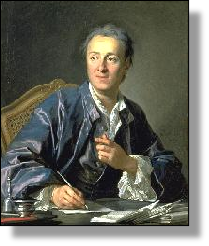 xxxxxThe French philosopher, dramatist and art
critic Denis Diderot is rightly famed for his editorship of the
remarkable Encyclopédie, first published in
1751 and taking
thirty years to complete. A materialist who saw the world in purely
mechanical terms, he put his stamp on this huge undertaking, a
collective, intellectual enterprise which brought advanced thinking to
bear upon the whole spectrum of human knowledge. As such it can be
seen as a major contribution and spur to what is termed the Age of
Enlightenment (or Reason), that movement which, starting imperceptibly
in the 16th century, became a force
that could not be ignored by the middle of the 18th.
xxxxxThe French philosopher, dramatist and art
critic Denis Diderot is rightly famed for his editorship of the
remarkable Encyclopédie, first published in
1751 and taking
thirty years to complete. A materialist who saw the world in purely
mechanical terms, he put his stamp on this huge undertaking, a
collective, intellectual enterprise which brought advanced thinking to
bear upon the whole spectrum of human knowledge. As such it can be
seen as a major contribution and spur to what is termed the Age of
Enlightenment (or Reason), that movement which, starting imperceptibly
in the 16th century, became a force
that could not be ignored by the middle of the 18th.
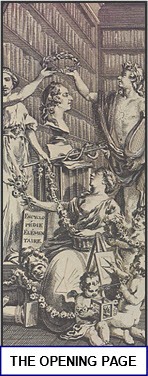
xxxxxDiderot was born in
Langres and, after being educated by Jesuits, gained a degree from
Paris University in 1732. It seems that for the next ten years or so
he scraped a living as a tutor and hack writer. Hisxfirst
major work was Pensées philosophiques, published
anonymously in 1746, and the following year he got a job editing a
French translation of Cylcopaedia, a
Universal Dictionary of Arts and Sciences produced by the English
writer Ephraim Chambers
(c1680-
xxxxxSome of the greatest minds
of the day contributed to this vast undertaking, and France at this
time had more than its fair share of free thinkers. Apartxfrom Diderot and the mathematician Jean le Rond
d'Alembert (1717-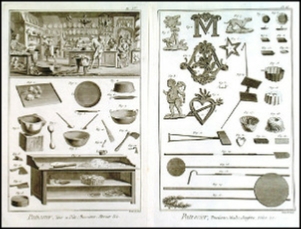 great
intellectuals of the age, Voltaire, Montesquieu
and Jean Jacques Rousseau. In their own
varying ways these "philosophes" set out
to liberate society from the superstition of the church, the
political conservatism of the ruling classes, and the rigid social
structure which had lingered on as a legacy of the feudal system. It
is hardly surprising that this "wind of change" should be seen as
nothing short of a hurricane by both church and state! In 1759 the
ten volumes which had already been printed were suppressed, and
further publication was forbidden. Undaunted, Diderot continued his
work, and had new volumes secretly printed.
great
intellectuals of the age, Voltaire, Montesquieu
and Jean Jacques Rousseau. In their own
varying ways these "philosophes" set out
to liberate society from the superstition of the church, the
political conservatism of the ruling classes, and the rigid social
structure which had lingered on as a legacy of the feudal system. It
is hardly surprising that this "wind of change" should be seen as
nothing short of a hurricane by both church and state! In 1759 the
ten volumes which had already been printed were suppressed, and
further publication was forbidden. Undaunted, Diderot continued his
work, and had new volumes secretly printed.
xxxxxIn the hands of such intellectual giants, this compendium of advanced opinion was not merely a record of man's achievement in thought and deed, but an insight into his potential for yet greater advancement once he had became the master of his own destiny. Whilst religion was tolerated, it was viewed with great scepticism. It was seen as restraining man by its superstition and the domination of the established church. Likewise the state, it was argued, should not be an instrument of political oppression, demanding unthinking obedience, but a means of creating happiness and the fulfilment of man's "natural rights".
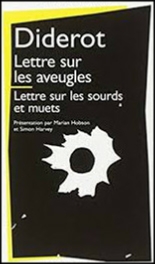
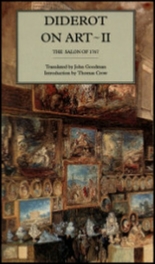 xxxxxThis was powerful stuff and, as we shall
see, exerted some influence on contemporary thought. But Diderot was
far more than an encyclopedist, brilliant though he was at compiling
his own contributions, and editing those of others. An able dramatist
and prolific writer, he produced the first two drame
bourgeois in 1757 and 1758. Entitled The
Illegitimate Son and The Father of the
Family, they were centred around the tragic and comic
elements of middle class life of his day, and concluded with an
appropriate moral lesson, an ending which became a standard feature of
this genre. More successful were his social satires in dialogue form,
Rameau's Nephew, and his Essay
on Blindness (Lettres sur
les aveugles), published in 1749, a study of the blind which
landed him in prison for three months because of his anti-
xxxxxThis was powerful stuff and, as we shall
see, exerted some influence on contemporary thought. But Diderot was
far more than an encyclopedist, brilliant though he was at compiling
his own contributions, and editing those of others. An able dramatist
and prolific writer, he produced the first two drame
bourgeois in 1757 and 1758. Entitled The
Illegitimate Son and The Father of the
Family, they were centred around the tragic and comic
elements of middle class life of his day, and concluded with an
appropriate moral lesson, an ending which became a standard feature of
this genre. More successful were his social satires in dialogue form,
Rameau's Nephew, and his Essay
on Blindness (Lettres sur
les aveugles), published in 1749, a study of the blind which
landed him in prison for three months because of his anti-
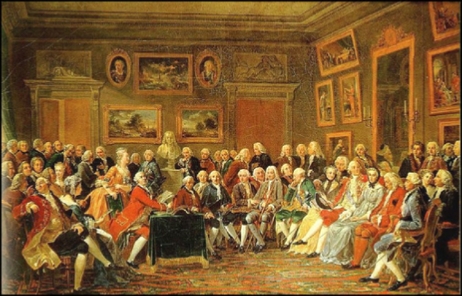 xxxxxIncidentally, in
the world of aristocratic women, the Age of Enlightenment produced a
cultivated society devoted to the art of intellectual discussion and
the qualities of politeness and civility. In this milieu Madame
de Pompadour (1721-
xxxxxIncidentally, in
the world of aristocratic women, the Age of Enlightenment produced a
cultivated society devoted to the art of intellectual discussion and
the qualities of politeness and civility. In this milieu Madame
de Pompadour (1721-
xxxxx…… That Diderot should spend only three months in prison for his Essay on Blindness is perhaps a little surprising when one of his offending statements reads: Man will never be free until the last king is strangled with the entrails of the last priest. (!) ……
 xxxxx...... Diderot's Supplément au voyage de Bougainville,
published in 1769, gives a critical account of the French explorer's
voyage to the South Seas during his trip around the world, the first
by a Frenchman. The tropical plant Bougainvillea
is named after him.
xxxxx...... Diderot's Supplément au voyage de Bougainville,
published in 1769, gives a critical account of the French explorer's
voyage to the South Seas during his trip around the world, the first
by a Frenchman. The tropical plant Bougainvillea
is named after him.
Including:
The Age of
Enlightenment
(or Reason)

xxxxxThe Age
of Enlightenment (or
Reason), was a wide ranging intellectual
movement based on the power of reasoning. It had deep roots. In the
16th century, for example, both the Renaissance and Reformation had
shown how man himself could accomplish change, whilst in the 17th
century explorers had opened up new horizons, and men like Francis
Bacon, Galileo, Descartes, Newton and Locke had questioned old ideas
and put forward new ones in philosophy, astronomy and the sciences.
As we have seen, in the 18th century these ideas were crystallised
in the Encyclopédie -
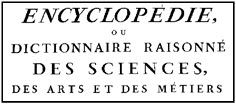 xxxxxThe Encyclopédie
was one of the principal works -
xxxxxThe Encyclopédie
was one of the principal works -
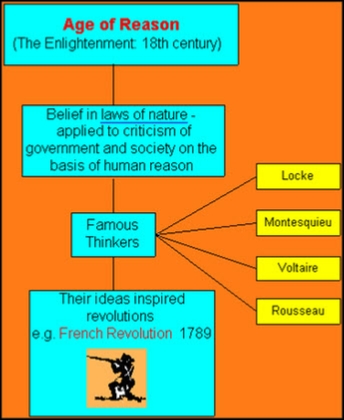 xxxxxThe 18th century saw the crystallizing of
these ideas in the Encyclopédie, a work
produced, as we have seen, by some of the best minds of the century -
xxxxxThe 18th century saw the crystallizing of
these ideas in the Encyclopédie, a work
produced, as we have seen, by some of the best minds of the century -
xxxxxBy the 1770s the Age of Enlightenment had reached its heyday and had spread beyond France, inspired by such talented men as Immanuel Kant and Gotthold Lessing in Germany, David Hume and Adam Smith in England, and Benjamin Franklin and Thomas Jefferson in the American colonies. Even despotic rulers like Frederick II of Prussia, Joseph II of Austria, and Catherine II of Russia (whom Diderot had visited in 1773), were seen as "enlightened" on the strength of some liberal reforms. However, they in no way embraced the democratic spirit. Furthermore, the idea that government based on reason would bring about universal happiness was to be shattered by the reign of terror in France in the early 1790s, and the stark dictatorship and militant nationalism which followed. And the further increase in class divisions brought about by the Industrial Revolution produced a society which was far removed from the movement's ideals.
xxxxxNonetheless, the declar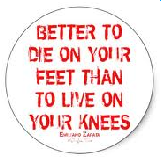 ation
that "all men" have a right to "life, liberty and
the pursuit of happiness", the
corner stones of the American Revolution, and the fervent belief of
the French Revolutionaries that man was born "free
and equal" owed much to Enlightened thought, and, put to
the test, ultimately led towards the spread of democracy and
equality. And in the shorter term, the movement did help to put some
limitation on such day-
ation
that "all men" have a right to "life, liberty and
the pursuit of happiness", the
corner stones of the American Revolution, and the fervent belief of
the French Revolutionaries that man was born "free
and equal" owed much to Enlightened thought, and, put to
the test, ultimately led towards the spread of democracy and
equality. And in the shorter term, the movement did help to put some
limitation on such day-


